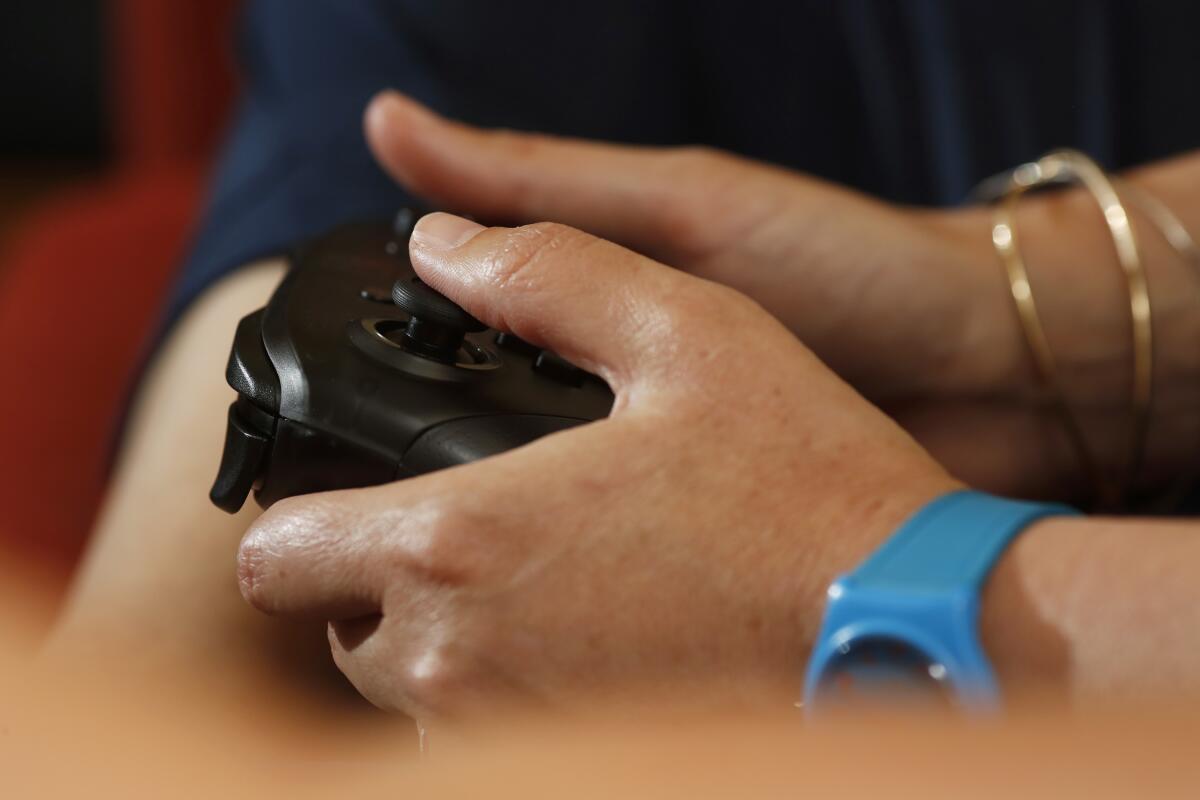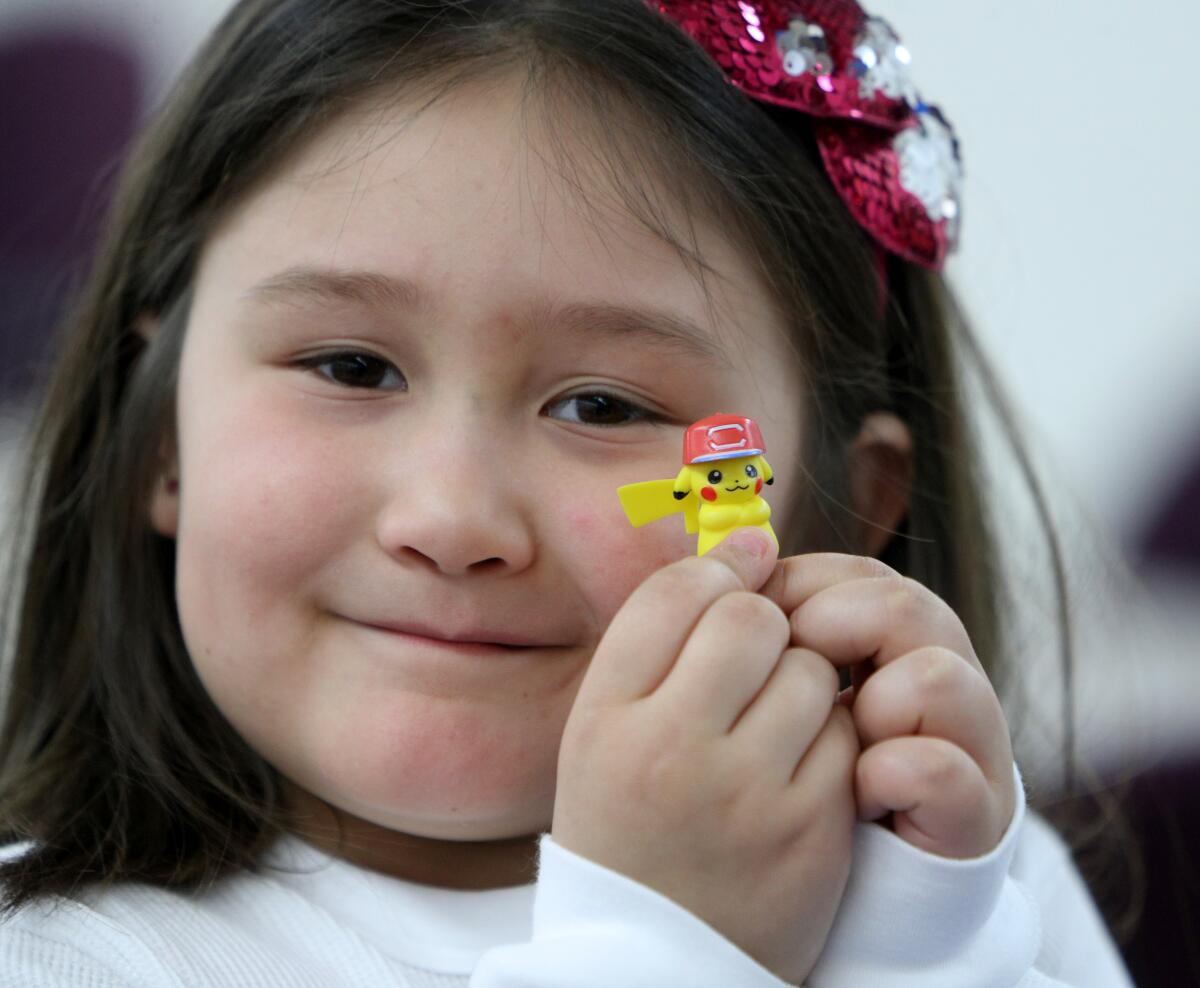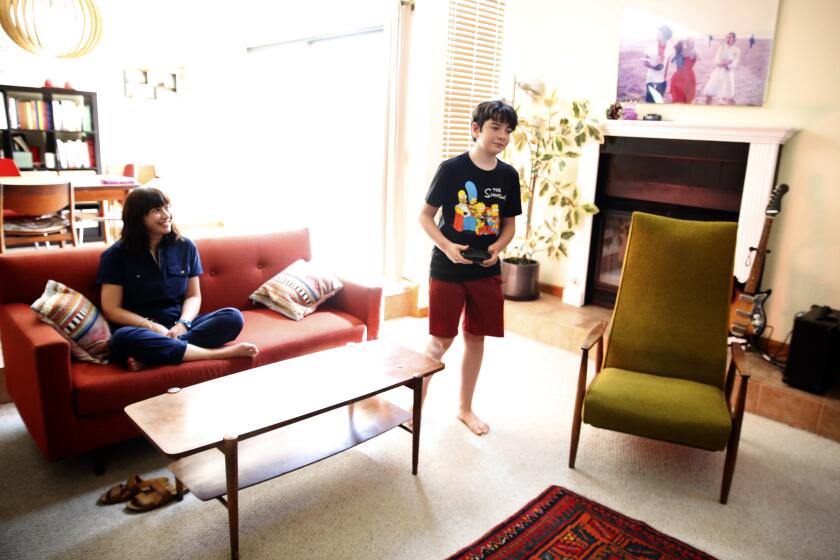8 to 3: What if everything we know about screen time is wrong?

No, video games probably won’t melt your kid’s mind. How to stop worrying and love the screen.
- Share via
This is the May 17, 2021, edition of the 8 to 3 newsletter about school, kids and parenting. Like what you’re reading? Sign up to get it in your inbox every Monday.
What are we going to do about screen time?
It’s a question my husband and I have often asked each other, and one other parents now increasingly ask me. Pre-pandemic, most of us had rules around how much time our kids could spend on YouTube, Minecraft or TikTok. But when schools went online and playgrounds were roped off, those high-minded ideals went out the window. Even Anya Kamenetz, who wrote the literal book on screen time, renounced her previous views.
Yet now, as our children once again emerge into public life, the hand-wringing over screen time has redoubled. Terms like “epic withdrawal” and “slippery slope” ricochet around the internet, and while many experts warn against pathologizing normal behavior, parents are increasingly stressed out. That was certainly true of my colleague Deborah Netburn, who found herself overwhelmed and alienated by her 12-year-old’s passion for video games.
In the COVID-19 era, my 12-year-old played more video games than ever. What kind of parent was I to allow this? But then I talked to experts.
That’s what made the story of how she learned to stop worrying and love the screen so inspiring to me when I read it. Not only did Deborah embrace video games, she started playing them with her son. I just had to know more. Our conversation has been lightly edited and condensed for clarity:
8 to 3: Tell me about your screen-time mentality pre-pandemic, and how it’s evolved.
Deborah Netburn: My kids have always gotten between one to two hours of screen time a day. What was challenging before the pandemic is that they felt this was owed to them. It was distressing to me that it was so essential to them that they got that. It really helped when we started making schedules, so that they know they’re not going to get it before 4 p.m., because otherwise they’d ask every 20 minutes. It really kind of grossed me out how much they cared about it.
8 to 3: It’s also so different to how we grew up as Gen Xers and millennials, respectively.
Deborah: Exactly, because when we were growing up, if you were out of the house at 4 and that’s when your show came on, of course you weren’t going to watch it. But the way my kids see it, every day they are owed or deserve their hour and a half of screen time.
8 to 3: And that felt like a parenting failure, that they were so attached to it.
Deborah: I had it in my head that it’s not good for kids to be on screens, that that is not a good way for them to spend their time, and that there’s a hierarchy of how one should spend one’s time.
My question now is, why did I think that? I had ideas about it, but I don’t really know where they came from.
(8 to 3 note: The American Academy of Pediatrics has advocated strict limits on screen time for years, but critics say there is actually little evidence of harm, except with moderate use for young toddlers and in heavy use among adolescents.)
Part of my own feelings of hierarchy is that playing with other people is better than by yourself. But I don’t know that that’s true. Because of the pandemic, [my kids] didn’t have opportunities to interact with other people besides through screens, so if they were playing with a friend I would let them play longer, because it felt like something else was happening. Specifically peer interaction, which we cannot give them on our own.
8 to 3: But it still made you feel bad.
Deborah: It can’t be overstated how disconnected I was feeling from my older son. I was just kind of like, I think you’re gross, and I don’t really respect how you choose to spend your time, and I don’t respect what you’re into. Whereas my younger one [9] makes these cool videos and is super into old-school hip-hop right now.
I think I just was like, I don’t want to dislike my kid this much, and what is it going to take to change my mind? It was trying to figure out how to start liking him more again. I was open to being told I’m wrong, or that the feelings I have are not right. [The experts I interviewed] all made really compelling arguments about why it really wasn’t that bad.
8 to 3: I just loved the part in your story where our colleague Todd Martens, who reviews video games for the Los Angeles Times, told you “your gut is wrong.”
Deborah: I was like, bring it. Tell me more. Hasn’t this just been a year of learning that the things we don’t even realize we’re thinking are wrong? Just waking up and asking questions about why we think the things we think? For me, this story was really a part of that. Just really questioning our belief systems and why we have these assumptions and looking at them a lot more closely. Noticing that we have them and asking why we have them and starting to dig around for facts.
8 to 3: As a mom, reading that list of questions Julia Storm gave you made me feel so much better. Because I genuinely hate that my kid watches adults play with Legos on YouTube. It drives me bananas — go play with your own Legos! But when I look past that to the gestalt of his well-being, I’m not so bothered by it anymore.
Deborah: Oh, my God, yes! That was amazingly helpful. Because don’t you just feel like — if you’re a parent and your friend is like, ‘We don’t even own a TV,’ or ‘My only kid watches 30 minutes of a French cartoon every day’ — I feel like, you are better than me, clearly. But why? Why do we think that? My kids are great, I have really nice kids. And if they like playing video games, who cares? It made me see so clearly, because I felt like there was a problem and it made me see there’s really no problem there. Playing video games doesn’t mean you have a problem. Loving screen time doesn’t mean you have a problem.
I hope a lot of parents felt better reading that part. Because it’s OK. Not everything we do has to be the very best thing for us. I can eat my sugar as long as I don’t eat nothing but sugar. They can play video games as long as they don’t do nothing but play video games.
8 to 3: Now that kids have more opportunities to socialize in person, do you think you will go back to the kind of screen-time limits you had pre-pandemic?
Deborah: I don’t personally feel like I need to bring it back. I’m totally fine with them doing this as long as it’s not the only thing they do. At one point my older son said to me, ‘if I had a choice between seeing my friends in person and playing video games with them, I would see them in person. I just don’t have a choice.’
When I talked to Sinem Siyahhan [a professor of educational technology at Cal State San Marcos], she sees video games as just as valuable as any other type of play. My kids watch people play video games and it doesn’t make any sense to me. Shouldn’t you be the one playing the video game? But when they play, they play it better, because they’re scholars of video games. So you never know where that’s going to lead.
The other thing I think a lot about is, what’s your end game? What do you want for this kid? And what I want for my kids is for them to be happy.

Vaccines are coming for young teens
The Los Angeles Unified School District announced plans Monday to begin vaccinating middle and high-school students at 250 schools across the district. Supt. Austin Beutner says the program will target 12- to 15-year-olds, with the aim of getting as many students as possible fully vaccinated before the start of the next school year. Times education writer Howard Blume writes: “Vaccination could be a key to getting students to return to campus in greater numbers. L.A. Unified reopened campuses in a staggered schedule starting the week of April 12. According to figures from last week, about 30% of elementary students have returned. The figure for middle schools is 12%; for high schools 7%.”
The district announced its plans after the Food and Drug Administration gave the nod to vaccinating 12- to 15-year-olds nationally. Here’s more about that from Hayley Smith and Deborah Netburn.
What about summer camps? Many parents will be relieved (and some perhaps alarmed) to know that they can operate pretty much normally for vaccinated kids, although with the now-familiar restrictions for those who haven’t been jabbed. Heather Hibbeler, owner and director of Sierra Sleep-Away Camp in Bass Lake, told Smith: “We’re looking forward to seeing our campers, having fun, smiling, making connections — just getting back to life and enjoying the great outdoors.”
Enjoying this newsletter?
Consider forwarding it to a friend, and support our journalism by becoming a subscriber.
Did you get this newsletter forwarded to you? Sign up here to get it in your inbox every week.
Early break uproar
Some teachers aren’t even waiting for summer to take a break. The San Francisco Chronicle reported on the uproar in Contra Costa County, where a teacher who had refused to return to in-person classes announced that she was heading to Mexico for 10 days for her son’s wedding and would be teaching remotely for some of that time — but leaving students on their own on the days she had festivities to attend to. Parents did not seem to be sharing her joy.
How do you motivate students? A little outrage works, one study finds. ...
A fascinating article in Scientific American explained the science behind what every parent knows — that 13-year-olds are concerned about status and respect and don’t want to be patronized by adults. Rather than lecturing eighth-graders about how bad junk food is for them, researchers showed the teens investigative reports on how food companies use unhealthy ingredients and target marketing at teens — all while prohibiting their own children from eating the products. “The students were outraged and began to see healthy eating as a way of taking a stand against being manipulated,” the article said, concluding that the study presents an important inflection point for teaching and dealing with adolescents: Parents and teachers should find ways to capitalize on the richness of learning their rapidly growing brains are craving.
Finally, our friends at the Hechinger Report, which covers education nationally, are highlighting a report that claims to have found a powerful solution to educational inequality. It’s called play.
The report, by the LEGO Foundation, found that children “showed significantly greater learning gains in literacy, motor and social-emotional development when attending child care centers that used a mix of instruction and free and guided play,” as opposed to those that didn’t emphasize play. I know what you’re thinking: the LEGO Foundation? Of course they’re pro-play! But the report actually summarizes the results of 26 prior studies, most of which presumably did not involve the use of Legos, as cool as they might be.

Sign up for Essential California
The most important California stories and recommendations in your inbox every morning.
You may occasionally receive promotional content from the Los Angeles Times.








